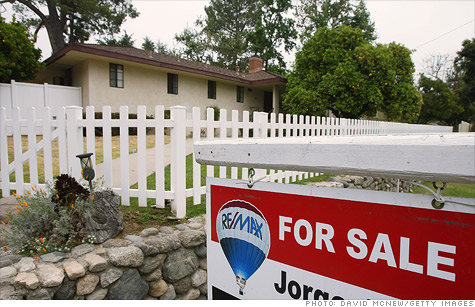Search News

NEW YORK (CNNMoney) -- The housing market started the new year with a thud. Home prices dropped for the fifth consecutive month in January, reaching their lowest point since the end of 2002.
The average home sold in that month lost 0.8% of its value, compared with a month earlier, and prices were down 3.8% from 12 months earlier, according to the S&P/Case-Shiller home price index of 20 major markets.
Home prices have fallen a whopping 34.4% from the peak set in July 2006.
"Despite some positive economic signs, home prices continued to drop," said David Blitzer, spokesman for S&P. "Eight cities -- Atlanta, Chicago, Cleveland, Las Vegas, New York, Portland, Seattle and Tampa -- made new lows."
Only three of the 20 index cities registered gains in January, led by Phoenix, which climbed 0.9% month-over-month, Washington, up 0.7%, and Miami, which edged 0.6% higher.
Housing market indicators have sent confusing signals so far this year, with existing home sales and new home sales down month-over-month in February, but up year-over-year.
Potential homebuyers lack confidence in the market, according to Michael Feder, CEO of Radar Logic, an analytics company that produces daily spot prices for real estate. A big problem looming is a massive number of potential foreclosures.
"People see that there are millions of homes underwater, and at elevated risk of foreclosure, and conclude that housing values are unlikely to appreciate in any meaningful way for many years," he said.
On the other hand, home builders have turned more bullish and are gearing up for more new construction. Mortgage rates are also still very favorable and the economy is getting better with hiring on the rise.
Ken H. Johnson, a real estate professor at Florida International University, thinks all these factors are helping the housing market turn around, but the recovery will take time.
"The housing market is like a large cruise ship that turns slowly, often temporarily losing ground due to currents and change in momentum," he said. "While the ship is turning, drags on the housing market are also present and must be addressed before a full recovery is accomplished."
Feder said there is some evidence that the housing market recovery is approaching. One clue is that regular sales, as opposed to bank sales of foreclosed homes, increased dramatically over the past few months.
That indicates that sellers have capitulated to the lower sales prices of foreclosures and have adjusted their expectations of the prices their homes can command in the market.
He called that a good thing, because it means the market bottom is near. Once it does turn, there could be a rapid increase in buying, said Feder, as there is a much pent-up demand for homes.
Despite the market current turmoil, home ownership is still the goal of most Americans, according to a survey released Tuesday by Fannie Mae.
It found that while financial constraints and employment concerns are keeping homebuyers on the sidelines right now, two-thirds of renters say they intend to buy someday.
"Some Americans may not be financially positioned to own a home in the near future," said Doug Duncan, chief economist for Fannie Mae.
"But they may begin to revisit that aspiration as employment and household balance sheets improve over the coming years," he said. ![]()
| Overnight Avg Rate | Latest | Change | Last Week |
|---|---|---|---|
| 30 yr fixed | 3.80% | 3.88% | |
| 15 yr fixed | 3.20% | 3.23% | |
| 5/1 ARM | 3.84% | 3.88% | |
| 30 yr refi | 3.82% | 3.93% | |
| 15 yr refi | 3.20% | 3.23% |
Today's featured rates: